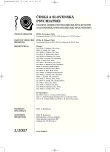Deniban in the Treatment of Dysthymia
Deniban v léčbě dystymie
Dystymie je chronická mírná deprese, která snižuje kvalitu života. V poslední době se ukazuje, že úspěšné v léčbě deprese mohou být i dopaminergně působící látky. Z těchto je v pro léčbu dystymie v ČR registrován amisulprid v malých dávkách (preparát Deniban). S Denibanem byla provedena u dystymie prospektivní, otevřená, observační studie. Zařazeno bylo 510 nemocných, 90 % léčených dokončilo čtyřměsíční studii a 87 % nadále hodlalo s léčbou pokračovat. Již po prvním týdnu došlo k signifikantnímu snížení symptomatologie (hodnoceno dle MADRS) a tento trend byl udržen do konce studie. U 83,4 % došlo k velmi výraznému nebo značnému zlepšení. Deniban byl dobře snášen, vedlejší účinky se vyskytly u 59/510 (11,57 %) léčených, nejčastěji se vyskytovaly: galaktorea u 11/510 (2,16 %), bolest hlavy u 7/510 (1,37 %), ospalost u 5/510 (0,98 %), nauzea a xerostomie 5/510 (0,98 %) a mastodynie u 4/510 (0,78 %). Tyto výsledky ukazují, že dopaminergní látky mohou být lékem volby u dystymie.
Klíčová slova:
dystymie, chronická mírná deprese, deniban.
Authors:
E. Češková
Authors‘ workplace:
Psychiatrická klinika LF MU a FN Brno
přednostka prof. MUDr. E. Češková, CSc.
Published in:
Čes. a slov. Psychiat., 103, 2007, No. 2, pp. 73-79.
Category:
Original Article
Overview
Dysthymia is a chronic, mild depression with an impact on the quality of life. Recently it has been shown that dopaminergic agents could be successful in the treatment of depression. Amisulpride which has in low doses (Deniban) dopaminergic activity is registered for the treatment of dysthymia in Czech republic. A prospective, open observational study of dysthymia treatment with Deniban has been performed. Totally 510 patients suffering from dysthymia were included. Ninety % of the patients finished all 4 months of the study and 87% of the treated wanted to continue with Deniban. A significant reduction of symptoms (according to MADRS) has been observed after one week and this trend has continued till the end of the study. In 83.4% of patients there was a marked improvement. Deniban subjects was well tolerated, side effects were found in 59/510 (11.57%) of the treated. The most frequently observed symptoms were galactorrhea in 11/510 (2.16%), headache in 7/510 (1.37%), somnolence in 5/510(0.98%), both nausea and xerostomia in 5/510 (0.98) and mastodynia in 4/510 (0.78%). These results show that dopaminergic drugs may be drugs of choice in dysthymia.
Key words:
dysthymia, chronic mild depression, deniban.
Labels
Addictology Paediatric psychiatry PsychiatryArticle was published in
Czech and Slovak Psychiatry

2007 Issue 2
- Memantine Eases Daily Life for Patients and Caregivers
- Memantine in Dementia Therapy – Current Findings and Possible Future Applications
- Hope Awakens with Early Diagnosis of Parkinson's Disease Based on Skin Odor
- Deep stimulation of the globus pallidus improved clinical symptoms in a patient with refractory parkinsonism and genetic mutation
-
All articles in this issue
- Symptoms of Limbic Irritability and Chaotic Activity in the Autonomic Nervous System during Cognitive Conflict in the Patients with Unipolar Depression: a New Perspective for Anticonvulsant Treatment?
- Deniban in the Treatment of Dysthymia
- Augmentation of Antipsychotics by Repetitive Transcranial Magnetic Stimulation Leads to a Remission of Negative Symptoms of Schizophrenia
- Suicide in the Light of Historical Attitudes of the Society and Some Forensic Aspects
- Czech and Slovak Psychiatry
- Journal archive
- Current issue
- About the journal
Most read in this issue
- Deniban in the Treatment of Dysthymia
- Suicide in the Light of Historical Attitudes of the Society and Some Forensic Aspects
- Symptoms of Limbic Irritability and Chaotic Activity in the Autonomic Nervous System during Cognitive Conflict in the Patients with Unipolar Depression: a New Perspective for Anticonvulsant Treatment?
- Augmentation of Antipsychotics by Repetitive Transcranial Magnetic Stimulation Leads to a Remission of Negative Symptoms of Schizophrenia
